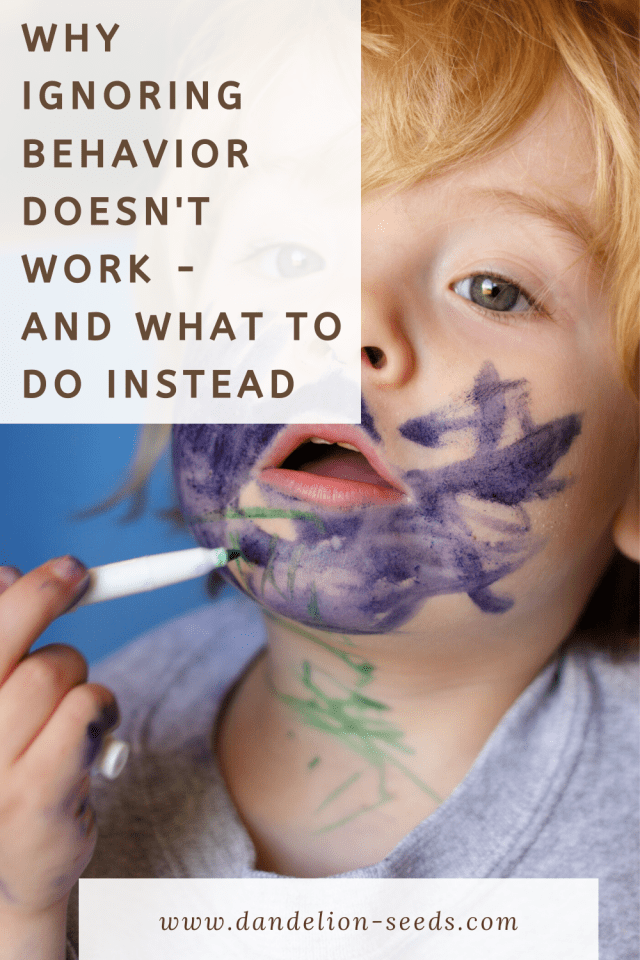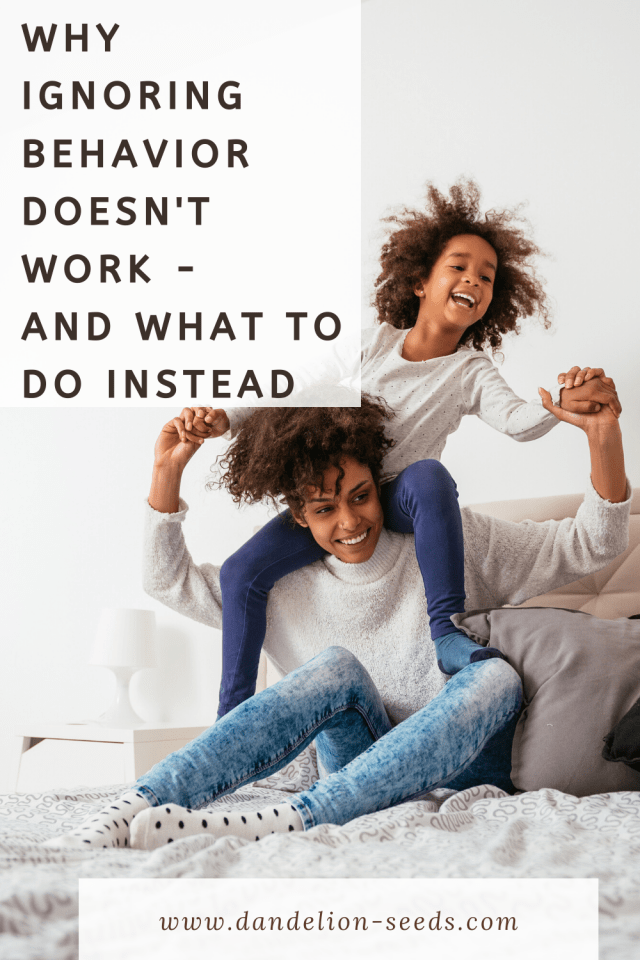
Sign in
Don't have an account with us? Sign up using the form below and get some free bonuses!

Many parents hear at some point -- often when they have newly emerging toddlers, but certainly much later, as well -- that their children's troubling behavior is simply attention seeking. Further, parents hear that the best thing to do is simply ignore the attention seeking behavior and it will naturally stop on its own.
There are some flaws to this parenting advice, however. It's true that attention seeking behavior isn't always pleasant, of course. That said, we need to explore what happens when we ignore it -- especially when parents perceive the advice to ignore the attention seeking behavior as meaning to ignore the child (often isolating the child in time-out or otherwise). We also need to know what to do instead.
But are they really attention seeking behaviors? It may help to reframe it. A helpful perspective to remember is that if a child is seeking attention, no matter the form, it's because they're craving connection with their trusted adult. Attention seeking is attachment seeking.
Although attention seeking behavior in adults can be problematic, it's completely developmentally normal and healthy for a child to crave attention from his or her caregivers. Their brain may be so dysregulated from anxiety or otherwise that they're unsure how to connect in a positive way. As a result, they grasp for whatever works. These attention seeking behaviors certainly do get our attention.
It is not a reflection of how "good" or "bad" a child is, however. Rather, it's a reflection of what behavior their brain is capable of manifesting in any given moment. Using the examples above, a child doing these things is likely longing to be "seen." Ignoring a child who feels this way would only exacerbate the problem.

Just like it can be confusing for an adult whose partner is giving him or her the so-called "silent treatment," it's even more baffling for children when we simply don't respond to whatever they're doing. What they know is what they observe: "My trusted adult isn't 'seeing' me. I've disappeared from their world." This perception may lead to feelings of isolation.
According to experts, the risk factors of feeling socially isolated are multi-fold:
"...poorer overall cognitive performance, faster cognitive decline, poorer executive functioning, more negativity and depressive cognition, heightened sensitivity to social threats, a confirmatory bias in social cognition that is self-protective and paradoxically self-defeating, heightened anthropomorphism, and contagion that threatens social cohesion..." (source)

While ignoring a child might "work" in some sense (they may stop performing the undesirable attention seeking behavior), it can come at a very high cost.
As Daniel J. Siegel, M.D., and Tina Payne Bryson, Ph.D., explain in their science-backed book, The Power of Showing Up (afflinks), one of the tenets of secure attachment in a child is feeling fully "seen." To do that, we need to acknowledge whatever our child is doing and address it accordingly.
Helpful reminder: Connect Before You Correct.
A child often isn't mentally capable of hearing instruction or correction when he or she is acting out. The part of the brain that handles those types of conversations is essentially in the "off" position until a calmer state of being is regained (source).
Therefore, it behooves an adult who understands this to essentially "wait out the storm" -- stay present with the child physically and emotionally, ensuring safety to everyone involved. If the child will let you, you can hold them, invite them to your lap for a story, or find another calming activity to help regulate the brain (turn the rational part back "on"). This may take awhile; that's okay. Let the emotions flow as much as they need to without invalidating the child's feelings or experience.
As soon as it's appropriate and still top of mind, the adult should describe what they've seen, "You didn't like when I said it was time to put away your toy cars, so you threw them all on the floor." Keep judgment out of it; state only the irrefutable facts.
From there, the adult can remember that it's not an "adult versus child" situation -- it's both parties working to solve whatever the problem is. The child is not the problem; the behavior is. In this example, it might look like, "We need to keep the floor clean so no one falls and gets hurt. Let's drive your cars back to their parking lot and keep everyone safe."
For a child who's emotionally grounded again by this point, playful parenting can prove immensely beneficial to accomplish whatever task needs to be completed. Further, it helps the child feel "seen" and empowered to be part of the family again, rather than ostracized from it.
Most importantly, this connection-based approach to attention seeking behavior shows them that our love is unconditional. That's the most important message they can possibly absorb.
One of the tricky things about the advice to ignore a child's behavior is that it doesn't have a start or stop date age-wise. If you heard, for example, that I -- a grown woman -- was so upset that I fell on the floor crying and refused to get up, and my husband simply walked away without even acknowledging me, you'd likely find it quite awful. Now, being an adult, I have a fully developed brain that's capable of communicating my needs to him.
Kids, however, don't have fully developed brains. In fact, the prefrontal cortex -- the part of the brain that
regulates rational thought, among other things -- doesn't fully develop until well beyond age 20. Further, children haven't had the opportunity to practice the skills that reflect emotional intelligence nearly as much as adults have. They literally do not have the mental toolkit they need to reliably control their emotions until many years from now.
That said, if an adult physically and/or emotionally ignores a child who's struggling (a risk factor vs. the alternative, the protective factor that is an adult's loving presence), the child has no model of how to better handle whatever tricky situation they're experiencing.
"...when risk factors are present and they are not mitigated by some protective factors children are more openly negative in their expressive behavior..." (source)
This translates to a snowball effect: a child who's behaving poorly is more likely to keep behaving poorly rather than learn an alternative, and more positive, way to behave.
We can model emotional regulation. Rather than matching our child's upset with our own, or leaving the child to "figure it out" on their own, we can model that it's okay to have feelings and express them maturely. (We do this knowing, of course, that children are by definition less mature than we are.)
Helpful reminder: Neurons that fire together wire together.
When a child is engaging in attention seeking behavior, we can help them cope by modeling a more appropriate way to manage their big feelings. We can help re-train their brains to understand that when they do an undesirable behavior, they can come to us for support rather than wait for our "disappearance" or punishment.
In learning to trust that we're an emotional safe haven for them, they can start to depend on us more consistently, and come to us proactively when they're struggling -- rather than acting out to get our attention.
If you're wondering whether the tricky attention seeking behavior is going to "wire itself together," it will only if we're inconsistent in our response or unclear about what a better alternative is. A caregiver who sometimes isolates or ignores the child, but other times is gentle and nurturing, would send a very confusing message about attention seeking behavior. Better would be for caregivers to reliably provide the emotional "how-to manual" for the child to follow by giving clear and age-appropriate directions.
Further, we can (and should) set healthy boundaries about what is and isn't acceptable behavior. What's more important for a child to know than "I can't do x," is "I can't do x, but I CAN do y." If we consistently remind them of what the boundary is and what the better solution is, that knowledge can create new pathways in the brain.

Experts agree that all behavior is communication. Even when we don't like the way a child is expressing what he or she wants, the underlying need that they're trying to convey doesn't magically go away if we ignore it. Perhaps the child is hungry or tired, or over- or under-stimulated. Or perhaps we've been on our phone too much and the child is lonely. Maybe they're simply seeking connection. (This is often the case.) The child might not even know why they're acting the way they are -- but they're still looking to their trusted adult to help them work through their big feelings.
If we could solve the attention seeking behavior with a hug, that's usually an easy fix. A snack? Doable (although we should be wary of "solving" problems by offering food every time). Some downtime or a game together? Sure. Whatever it is, if we can find the root cause, it's much more effective to address that than to pretend it's not there. Lest we do that, we risk sending the message to our child that their needs don't matter.
Helpful reminder: Needs are needs are needs are needs.
Just like we did when our children were babies, it's helpful to have a mental (or even a physical) checklist to review:
We sometimes assume that just because kids are older, we can throw away the old checklist. In truth, though, it's as valid as it ever was.
One of the most important things we can do is know what's developmentally appropriate for our child. It's a wonderful investment of your time to study this, not only for your child's sake, but also for your understanding of how to parent appropriately. (A key takeaway is that play will continue to be your child's primary "language" for many of their formative years.) Even more than that, it's critical that we know our own child; even more than what the parenting books or experts say our child "should" be doing. We know our kids best.
Once again, we need to reframe attention seeking behavior from having a negative connotation to a developmental expectation that we have of our children. Of course they need our attention. They're children. What they want more than anything is to rely on our acceptance, our unconditional love, and our consistent emotional presence.
Related: Reframing the Terrible Twos
Sarah R. Moore is an internationally published writer and the founder of Dandelion Seeds Positive Parenting. You can follow her on Facebook, Pinterest, and Instagram. She’s currently worldschooling her family. Her glass is half full.
